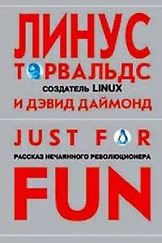Linus Torvalds - Just for Fun
Здесь есть возможность читать онлайн «Linus Torvalds - Just for Fun» весь текст электронной книги совершенно бесплатно (целиком полную версию без сокращений). В некоторых случаях можно слушать аудио, скачать через торрент в формате fb2 и присутствует краткое содержание. Город: NewYork, Год выпуска: 2001, ISBN: 2001, Издательство: HarperCollins Publishers, lnc., Жанр: Программирование, на английском языке. Описание произведения, (предисловие) а так же отзывы посетителей доступны на портале библиотеки ЛибКат.
- Название:Just for Fun
- Автор:
- Издательство:HarperCollins Publishers, lnc.
- Жанр:
- Год:2001
- Город:NewYork
- ISBN:0-06-662072-4
- Рейтинг книги:4 / 5. Голосов: 2
-
Избранное:Добавить в избранное
- Отзывы:
-
Ваша оценка:
- 80
- 1
- 2
- 3
- 4
- 5
Just for Fun: краткое содержание, описание и аннотация
Предлагаем к чтению аннотацию, описание, краткое содержание или предисловие (зависит от того, что написал сам автор книги «Just for Fun»). Если вы не нашли необходимую информацию о книге — напишите в комментариях, мы постараемся отыскать её.
Just for Fun — читать онлайн бесплатно полную книгу (весь текст) целиком
Ниже представлен текст книги, разбитый по страницам. Система сохранения места последней прочитанной страницы, позволяет с удобством читать онлайн бесплатно книгу «Just for Fun», без необходимости каждый раз заново искать на чём Вы остановились. Поставьте закладку, и сможете в любой момент перейти на страницу, на которой закончили чтение.
Интервал:
Закладка:
When we released Version 1.2 in March 1995, the kernel had grown to include 250,000 lines of code, the new magazine Linux Journal claimed a 10,000-reader circulation, and Linux was capable of running on Intel, Digital, and Sun SPARC processors. That was a big step.
II.
It's 1995 and there is a host of growing commercial versions, and Linux companies are attracting a strong following. The university has elevated me from a teaching assistant to a research assistant, which means more money and less time teaching. I'm slowly -- very slowly -- completing the coursework for my master's degree, which is about porting Linux to different architectures. Tove has introduced me to squash, and we have a weekly game; we're fairly evenly matched.
From this bliss, a problem emerges. It turns out that an opportunistic fellow from Boston has registered the trademark for the word Linux. Not only that, but he sent email to the Linux Journal and a few other Linux companies asking for 5 percent of their revenues as a "thank you" for the trademark.
When I heard about this, I felt a twinge of deja vu. The guy's name sounded familiar. I checked my email archives and saw that maybe a year and a half earlier he had sent me an unsolicited email in which he first asked me if I believed in God, and then said he had a tremendous business opportunity for me. This was before spamming became a global obsession, the innocent years before anyone thought to pollute the Internet with offers of get-rich-quick schemes. No, I hadn't bothered responding to the fellow's email, but because it was so unusual for its time, I saved it.
So we had a little crisis on our hands. We were hackers. Nobody thought about checking the trademark register.
The guy wasn't a professional trademark squatter. He apparently just did it this one time. Trademarks come in different categories, and he registered his in the computer category. You have to submit evidence with your trademark application, so he gave the trademark office a disk on which he claimed to have a program called Linux.
There was some panic. Everybody in the Linux community knew we would contest the trademark. The problem was, we didn't have an organization for putting up a good fight. There wasn't even enough money to hire a lawyer. None of the companies felt comfortable about laying down the required amount, which was $15,000. (Today they go through that in a month's worth of Mountain Dew.) But at the time, it was a considerable amount of money for a single company. So Linux Journal and some other companies decided to pump money into Linux International, which would fight the trademark. Linux International had been started in Australia by a person named Patrick D'Cruze who migrated to the United States in 1994 to help promote Linux worldwide. The year of the trademark dispute was the year when Maddog became its executive director. Everybody trusted him, and still does.
I was in Finland, trying to beat Tove in squash or to beat Avuton in snooker, and I had no interest in getting involved in this. I just wanted the entire nightmare to go away. My preference at the time was to just get rid of the trademark, to get it declared invalid because of prior use in the industry. We had enough paperwork to show that Linux had, in fact, a history of prior use. The trouble was, our lawyer convinced us that it would be a wasted effort, that we should not even try to get Linux declared a public domain instead of a trademark. The only way for it to really be in the public domain, he explained, was for it to become generic. And Linux at the time wasn't that generic. The trademark office probably wouldn't even consider it to be generic today. We could lose the battle, he said. Or if we invalidated the old trademark, somebody could possibly come along and trademark it anew.
The solution he suggested was to transfer the trademark to somebody else. My vote went to Linux International, but there was a lot of opposition to that. Linux International was young and unproven. People were worried about Linux International being taken over by commercial interests. (It hasn't happened, I might add.) There was also strong concern about who would eventually take over for Maddog if he were to step down.
So all eyes looked to me. The lawyer suggested that the legal arguments would be easier if the Linux trademark were to be transferred to me because I was the original user of the word. That's the strategy we took. We reached an out-of-court settlement because that seemed like the easiest and cheapest thing to do. Like most out-of-court settlements, the details can't be discussed. Not that I even know them. I was happily uninterested in it all.
When I went back to check my original email from the guy, I realized that it had nothing to do with patents. It was obvious that he just wanted to talk to me. Maybe he tried to contact me to get me to pay him. Or maybe, if I had shown myself to be a true believer and soul brother in his faith, he would have just given me the trademark. I don't know.
I accept the fact that some people are not morally all there. But what was more irritating at the time was the fact that the entire trademark system put this onus on me, who had done nothing wrong, to go out and fight the guy.
As a result of the messy squirmish, I hold the Linux trademark. What that means is, when companies like VA Linux file for an IPO, their prospectus has to mention the fact that the company doesn't even own the trademark for half of its name. (In that particular case, the company was involved in the legal process of getting approval from me to use the word Linux.) But I've gotten accustomed to that sort of thing.
The trademark episode was just an unexpected growing pain for Linux. And a distraction. But no sooner was it settled then another surfaced: An engineer at Intel's research lab in Portland, Oregon, said his company was using Linux in its exploration of new architectures. He asked me if I wanted to move there for a six-month internship.
Tove and I had spoken in vague terms about possibly living in the United States. She knew how much I had enjoyed my few visits there, root beer notwithstanding. We agreed that the opportunities -- not to mention the climate -- were better in America. (By the way, I am totally convinced that the U.S. system of motivating employees is far more realistic, and produces better results, than the European model. In Finland if a worker is much better than his colleagues, you give him just a little more money and keep it very quiet. In America, you give him a lot more money -- and it works.) The internship seemed like a great way of testing the waters, or, since it was in the Pacific Northwest, the rainwaters, and we agreed that I should pursue the opportunity. But I was ambivalent. I felt a bit uneasy about leaving school without having finished my master's. Something inside me, possibly the memory of my professor grandfather, didn't take to the notion of being a dropout. In the end, my feelings didn't even matter. The engineer's manager decided that it would be difficult for me to obtain the required six-month work permit from the U.S. Immigration and Naturalization Service for the internship.
So we stayed in Helsinki. By the time Finland's legendary revelers were toasting the arrival of New Year's Day, 1996, I was inching toward the master's degree finish line. I only needed to complete one small course to finish the credit requirements. And I also had to write my thesis. Ironically, it would be the first time I got any academic credit for my work on Linux, which had consumed most of my life throughout my college years.
The year 1996 brought with it a wake-up call. In egalitarian Finland, you get a state-mandated seniority raise after you've been at a job for three years. When I saw my first pay stub reflecting the new salary, I felt a jolt: I had been working at the university long enough to be given seniority. Would I spend my entire working career there? Was I destined to become my grandfather? Remember my description of him from earlier in this book: bald, overweight, and not smelling like anything. I started checking myself in the mirror with some regularity. My hairline was creeping back a couple of millimeters. Extra kilos seemed to have made their way to my once-skinny torso. I was twenty-six and for the first time in my life I was feeling old. I had been at the university for going on seven years; I knew I could graduate fairly quickly if I got my act together.
Читать дальшеИнтервал:
Закладка:
Похожие книги на «Just for Fun»
Представляем Вашему вниманию похожие книги на «Just for Fun» списком для выбора. Мы отобрали схожую по названию и смыслу литературу в надежде предоставить читателям больше вариантов отыскать новые, интересные, ещё непрочитанные произведения.
Обсуждение, отзывы о книге «Just for Fun» и просто собственные мнения читателей. Оставьте ваши комментарии, напишите, что Вы думаете о произведении, его смысле или главных героях. Укажите что конкретно понравилось, а что нет, и почему Вы так считаете.












